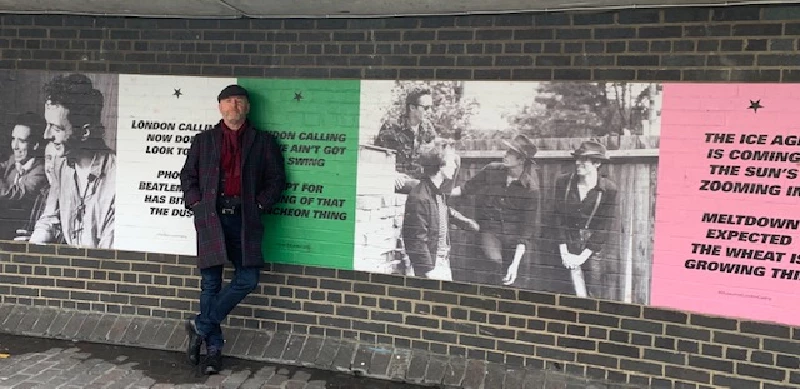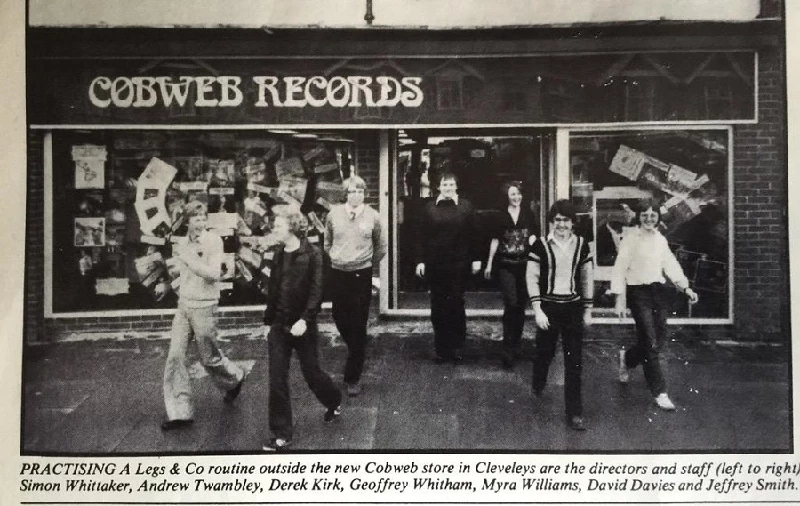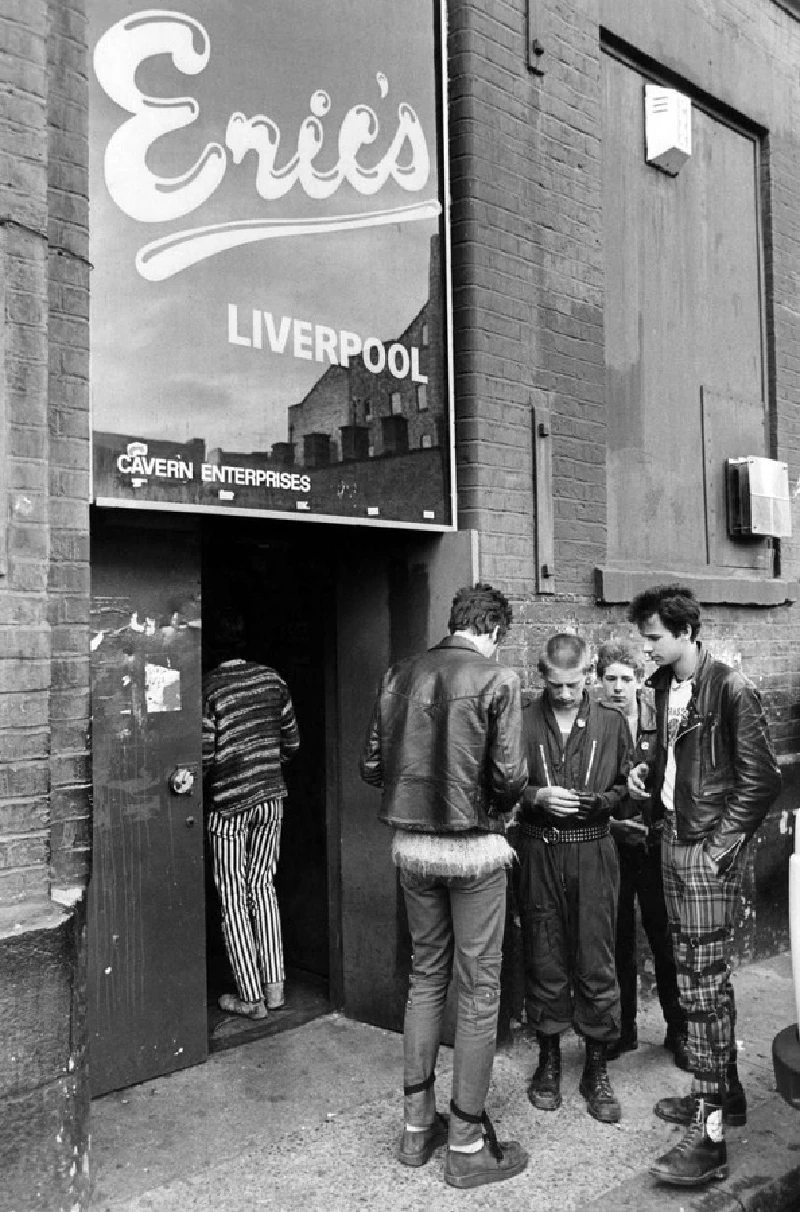"It’s a horrible, disgusting place. Filthy." Safe to say Manchester-based lawyer, music photographer and scribe Andrew Twambley won’t be getting fan mail from the Blackpool tourist board. His aversion for his home town (‘unless you get out at 18, you’re stuck forever’) is the obverse of his passionate delight in things that matter to him. Liverpool, the "very fine city" where he went to study law launched him into a life defined by the righteous energy of punk. Twambley took a morning off from litigating and planning his next photography foray to lead a guided tour of his colourful life in music. What musical culture(s) did you identify with most strongly as a young person? When I was very young, pop and glam. Then I went to Eric’s Club in Liverpool and never looked back. Punk rock became the definition of my musical life. I had a job in a record shop near Blackpool. A colleague and I persuaded the old-fashioned owner we should open a punk rock section. We were given one compartment in a big rack, then it took off and we got a whole rack, then a whole row. We became known as the only place you could get punk records. How has your relationship with music evolved? My current taste is wide ranging but most of the strands can be traced to punk rock. Discovering punk was the tipping point between youth and being grown up. It opened my eyes to what can happen in music. The first punk band I saw was the Runaways at Eric’s in 1976. We went every week for three years and saw everybody. Everyone started off at Eric’s. I have a suit-and-tie life as a lawyer, then I drop my waistcoat, put on my Pennyblack t-shirt and become a different person. What are the biggest differences in your musical taste between ‘then’ and ‘now’? The biggest differences are volume and capacity. With streaming, the world is your lobster. You can go down rabbit holes. In the last year I’ve become a fan of death metal. The bands put on a great show. They try. And so does the audience. It’s great to photograph. A man of my age shouldn’t be into death metal but it looks fantastic. Every song is too loud, and the same, but it looks great and it’s very exciting. What attracts you to an artist/band? There’s two different avenues. There’s the music, which goes back to the early day. Then the photography side. What looks good and what sounds good; I’m interested in both. When John [Clarkson] sends me out to take photographs I might shoot someone I’ve never heard of, but have a fantastic time. My favourite bands are The Clash and Joy Division. Both of whom I saw at Eric’s on more than one occasion. Joy Division is one of those artists you never get tired of. It’s hard to imagine that voice came out of Ian Curtis. They were mind-blowing. The live music was different from the albums, far edgier. They were two different bands. The Clash were another matter. I followed them around the West Coast of America for six months in 1979. I’d finished uni and was bumming around. It seemed like a great thing to do, and it was. What’s a band you used to love that makes you cringe now? Many bands that were massively cringe-worthy have become cool, like Slade and David Essex. There’s no band I’m ashamed of. I’m proud of my musical heritage. Who’s an artist you came to late but now love unreservedly? The Cure. In the early 80s I completely missed them. Then, around 2010, I was on my computer listening to various bits and ‘A Forest’ came on, I loved the sound, the great bassline. From then, I rediscovered all the albums. Their music is timeless. Three gigs that meant something extra-special? A) Queen, March, 1974, the first gig I ever went to. My big brother took me. Queen were a largely unknown glam rock band. It was imprinted upon my mind, that gig. I was deaf for a week. They were all wearing white ballgowns. B) The Clash, Rock Against Racism, April 1978 Rock Against Racism. We got a coach down at 6AM. Arrived in Trafalgar Square, then walked to Victoria Park for this gig headlined by The Clash. C) Joy Division at Liverpool Uni, Nov 1979 when they supported the Buzzcocks, the last time I saw them. It was a special gig. It was like you were there onstage with them. When and how did you get involved with Pennyblackmusic? About four years ago I attended an event in Manchester called Louder Than Words as a photographer. I ran into [Pennyblackmusic writer] Nicky Crewe and was bemoaning my lack of access to gigs. She suggested I contact John Clarkson. Now, I probably email him every day [looking for gigs to shoot]. Why does music writing matter? Music in connects people. I can’t understand the few people I know who ‘don’t do music’. How do they survive without music? What do they do? Watch telly? Tell us about a memorable Pennyblack interview? Steve Harley of Cockney Rebel fame. They were my favourite band in the 70s. He was such a lovely man, despite the fact he has probably done hundreds of interviews, so enthusiastic and interesting. I was a bit of a fan boy. He was such an important figure to me in my early teens. How has your experience of music changed over the past 18 months? In March 2020, John sent me to shoot Elvis Costello in Blackpool, then everything shut down. Music was there. But live music was gone. Now, you’d never know there had been a pandemic. People throw caution to the wind. Once I get into the mood, I throw caution to the wind too. What is an image that encapsulates your life in music? I introduced a feature to Pennyblack called 'The Image That Makes Me Weep' and did the first one, The Clash playing in front of the Eric’s sign. This encapsulates my life in music. Take 5… 1. The first song you remember? ‘Please Please Me’ by the Beatles. I was watching my brother fight some school kids and that was playing in a shop in the background. 2. A song you’d play at a wedding? ‘Conquest of Paradise’ by Vangelis, which we did play at my wedding. I saw the film with my fiancee, loved the music and thought that would be great in our wedding. 3. A song you’d play at a funeral? ‘The Eternal’ by Joy Division. So melancholy. 4. The artist you’d most like to interview? Paul Simenon from The Clash. He’s hard to get hold of. He’s not promoting anything so he doesn’t need to do interviews. 5. The one artist you’d most like to be? Jimmy Page. In his day, in the late 60s and early 70s, he was the coolest guy on earth. 6. The song you never, never get tired of… That’s easy, actually. One song was my favourite in 1973, and still is: ‘Sebastian’ by Cockney Rebel. I’ve listened to it a thousand times but still get a tingle down my spine. It has to be listened to on vinyl, on big speakers.
Also In A Life in Music
Article Links:-
https://pennyblackmusic.co.uk/Home/Details?id=25355https://pennyblackmusic.co.uk/Home/Details?id=25354
https://pennyblackmusic.co.uk/Home/Details?id=26876
https://pennyblackmusic.co.uk/Home/Details?Id=26063
Band Links:-
https://pennyblackmusic.co.uk/Home/Details?id=25355https://pennyblackmusic.co.uk/Home/Details?id=25354
https://pennyblackmusic.co.uk/Home/Details?id=26876
https://pennyblackmusic.co.uk/Home/Details?Id=26063
Play in YouTube:-
Picture Gallery:-



intro
In her series, 'A Life in Music', in which she speaks to Pennyblackmusic staff about how music has affected and influenced them, Cila Warncke talks to our photographer and writer Andrew Twambley .
most viewed articles
current edition
Carl Ewens - David Bowie 1964 to 1982 On Track: Every Album, Every SongArmory Show - Interview with Richard Jobson
Colin Blunstone - Thalia Hall, Chicago, 16/7/2025
Bathers - Photoscapes 1
Visor Fest - Valencia, Spain, 26/9/2025...27/9/2025
John McKay - Interview
Billie Eilish - O2 Arena, London, 10/7/2025
Robert Forster - Interview
Sir Tim Rice - Interview
Loft - Interview
previous editions
Heavenly - P.U.N.K. Girl EPManic Street Preachers - (Gig of a Lifetime) Millennium Stadium, Cardiff, December 1999
Beautiful South - Ten Songs That Made Me Love...
Pixies - Ten Songs That Made Me Love...
Oasis - Oasis, Earl's Court, London, 1995
Paul Clerehugh - Interview
Trudie Myerscough-Harris - Interview
Prolapse - Interview
Doris Brendel - Interview
Peter Perrett - In Dreams Begin Responsibilities Interview Part One
most viewed reviews
current edition
Phew, Erika Kobayashi,, Dieter Moebius - Radium GirlsAmy Macdonald - Is This What You've Been Waiting For?
Sick Man of Europe - The Sick Man of Europe
Davey Woodward - Mumbo in the Jumbo
Alice Cooper - The Revenge of Alice Cooper
Blueboy - 2
Cynthia Erivo - I Forgive You
Lucy Spraggan - Other Sides of the Moon
Bush - I Beat Loneliness
Suzanne Vega - Flying With Angels
Pennyblackmusic Regular Contributors
Adrian Janes
Amanda J. Window
Andrew Twambley
Anthony Dhanendran
Benjamin Howarth
Cila Warncke
Daniel Cressey
Darren Aston
Dastardly
Dave Goodwin
Denzil Watson
Dominic B. Simpson
Eoghan Lyng
Fiona Hutchings
Harry Sherriff
Helen Tipping
Jamie Rowland
John Clarkson
Julie Cruickshank
Kimberly Bright
Lisa Torem
Maarten Schiethart